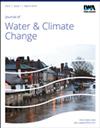气候变化下跨界河流流域水量-水质评价的实例研究
IF 3.1
4区 环境科学与生态学
Q2 WATER RESOURCES
引用次数: 0
摘要
本研究将水文和水质模拟模型与水资源规划模型相结合,对位于阿富汗、土库曼斯坦和伊朗边境的哈里鲁德河大坝建设下的未来供水条件进行了预测。在气候变化和阿富汗上游未来发展的背景下,评估了可持续性要求和沿岸国家之间可能发生的冲突。对哈里鲁德河Doosti大坝流域的水量和水质进行了当代(1955-2015年)调查,以预测未来(2020-2099年)的状况。基于5种偏差校正气候模式,应用了具有代表性的浓度路径情景。结果表明:研究区大部分地区气温升高(1.5 ~ 3.8℃),降水量减少(19 ~ 24%);在萨尔玛大坝建成后,Doosti大坝的入水量减少了约70%,在RCP 8.5气候变化情景下,伊朗和土库曼斯坦农业供水的可靠性和可持续性将降至3%以下。在大多数情况下,杜斯堤水库的富营养化状态在雨季转变为富营养化。结果表明,Doosti大坝并不是满足伊朗第二大城市马什哈德生活用水需求的可靠来源。本文章由计算机程序翻译,如有差异,请以英文原文为准。
Water quantity–quality assessment in the transboundary river basin under climate change: a case study
Abstract This study combined hydrological and water quality simulation models with a water resources planning model to project future water supply conditions under the dam construction in the Harirud River, located at the Afghanistan, Turkmenistan, and the Iran border. The sustainability requirements and possible conflicts among riparian countries were assessed under climate change and future development in Afghanistan's upstream. The water quantity and quality of the Doosti Dam Basin on the Harirud River were investigated based on a contemporary time (1955–2015) to predict the future condition (2020–2099). The representative concentration pathway scenarios were applied based on five bias-corrected climate models. Results showed that most areas of the study area experienced an increase in temperature (1.5–3.8°C) and a decrease in precipitation (19–24%). The Doosti Dam inflow decreased by about 70% after the Salma Dam construction, and the reliability and sustainability of agricultural water supply in Iran and Turkmenistan will reduce to less than 3% under the RCP 8.5 climate change scenario. In most scenarios, the eutrophication status of the Doosti Reservoir changed to hypereutrophic during the wet months. The results show that the Doosti Dam is not a reliable source to supply the domestic water demand of Mashhad, the second most important city in Iran.
求助全文
通过发布文献求助,成功后即可免费获取论文全文。
去求助
来源期刊

Journal of Water and Climate Change
WATER RESOURCES-
CiteScore
4.80
自引率
10.70%
发文量
168
审稿时长
>12 weeks
期刊介绍:
Journal of Water and Climate Change publishes refereed research and practitioner papers on all aspects of water science, technology, management and innovation in response to climate change, with emphasis on reduction of energy usage.
 求助内容:
求助内容: 应助结果提醒方式:
应助结果提醒方式:


